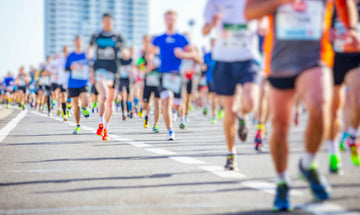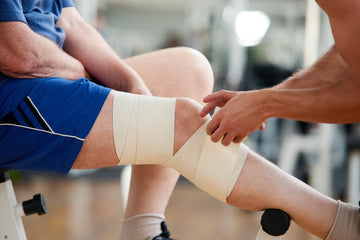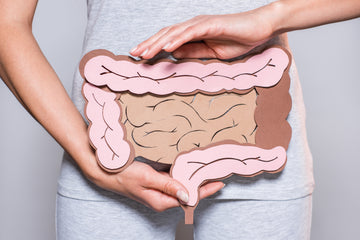Marathon runners know the importance of a training routine to build up the strength and stamina it takes to complete 26.2 miles. Just as important as the training beforehand, however, is your marathon recovery plan. Participating in a marathon puts your body through a rigorous endurance trial, making recovery from a marathon an entire process unto itself.
Today, we’re looking at six things your post marathon recovery plan should include. From physical and mental challenges to recovery techniques and tools, continue reading to learn how to take care of your body and round out your marathon experience.
Physical and Mental Challenges After a Marathon
Completing a marathon is a significant physical and mental achievement, but it also presents a range of challenges that require careful management and treatment as part of your post marathon recovery plan.
Physical Challenges
Muscle soreness and fatigue: Running a marathon places immense strain on your muscles, leading to soreness and fatigue. It's essential to dedicate time for muscle recovery from a marathon in order to heal.
Inflammation and joint pain: Running a marathon puts a heightened amount of strain on your joints which may result in inflammation and joint pain. Learning what helps stiff joints should be part of any post marathon recovery plan.
Minor sports injuries: Runners may experience minor injuries such as sprains, strains, or blisters during a marathon. Part of your post marathon recovery plan should include assessment and treatment of these. You’ll also benefit from learning how to prevent running injuries during your pre-marathon training routine to minimize risk.
Dehydration: Long-distance running will result in fluid and electrolyte loss through sweat. Replenishing fluids and electrolytes is essential to restore balance and support optimal recovery from a marathon.
Mental Challenges
Post-marathon blues: After the excitement of crossing the finish line subsides, some runners experience post race blues. Feelings of emptiness, letdown, or even mild depression can occur due to the culmination of months of focused training and the absence of a clear goal. Recognize these emotions as normal and give yourself time to adjust as part of your post marathon recovery plan.
Sense of purpose: Finishing a marathon often brings a profound sense of accomplishment and fulfillment. However, the shift from marathon preparation and training to post marathon recovery can leave runners struggling with a temporary loss of purpose and identity.
Mental fatigue: The physical and mental demands of marathon training can lead to burnout. It's crucial to recognize the signs of mental fatigue, such as reduced motivation, decreased performance, or irritability so you can adjust to manage them during your post marathon recovery period.
Body image: Some runners may experience body image concerns or engage in comparisons with other runners during post marathon recovery. Remember that bodies come in various shapes and sizes, and the focus should be on overall health and well-being rather than comparing yourself to others.
Techniques and Tools for Post Marathon Recovery
Proper post marathon recovery requires a comprehensive approach that combines various techniques and tools to aid in the healing process. It’s vital that you have an actionable marathon recovery plan in place to immediately begin working on helping your body heal itself after such an endurance test.
Some of the most common techniques and tools for post marathon recovery are:
- Massage therapy
- The R.I.C.E. method
- Proper hydration and a healthy diet
- Heat therapy application
- Stretching and mobility exercises
- Restorative sleep
1. Massage Therapy
One of the most effective methods for post marathon recovery is getting a massage. Sports massage techniques like deep tissue massage benefits aid in relieving muscle tension, improving circulation, and promoting faster recovery. Additionally, self-myofascial release techniques, like foam rolling or using a massage ball, can aid in releasing muscle knots and improving flexibility.
Instead of worrying about making an appointment with a traditional massage therapist immediately after finishing your marathon, consider the benefits of owning a massage chair, instead. Today’s luxury massage chairs have effectively eliminated the main differences between using a massage chair vs human massage. This means your massage chair gives you access to different types of massage programs at the touch of a button right when you need it. No need to wait for an appointment or even leave the comfort of home.
Additionally, massage chair benefits for athletes enhance your post marathon recovery plan by pairing other features like heat therapy, chromotherapy, and zero gravity reclining capabilities. These complementary therapies elevate your massage experience further, helping you heal faster and preparing you for your next fitness challenge.
2. The R.I.C.E. Method
Rest is crucial for post marathon recovery. Allow your body time to recover by reducing or avoiding intense physical activities for a period of time. The R.I.C.E. method (Rest, Ice, Compression, Elevation) can be effective for managing acute injuries or inflammation. Applying ice packs, using compression garments, and elevating your legs can help reduce swelling, ease pain, and facilitate healing.
You can pair up multiple methods of your marathon recovery plan by using a zero gravity massage chair as part of the “Elevation” step of the R.I.C.E. method.
3. Proper Rehydration and a Healthy Diet
Another element of your post marathon recovery plan should be rehydration. Proper hydration and nutrition are essential for optimal recovery. During a marathon, your body will lose water and electrolytes through natural processes like sweating.
Replenish your body with fluids and electrolytes lost during the marathon. Drink water regularly and consider incorporating electrolyte-rich beverages or sports drinks. Focus on consuming a well-balanced diet that includes lean proteins, complex carbohydrates, healthy fats, and ample fruits and vegetables to support muscle repair and overall recovery. You need to replace glycogen in your muscles in order for them to heal more quickly and fully.
4. Heat Therapy
The benefits of heat therapy as part of a post marathon recovery plan can’t be overstated. Heat therapy relaxes muscles, improves circulation, and promotes faster healing. You might apply warm towels, take warm baths, or use heating pads on specific areas of soreness or stiffness.
As another example of combining multiple methods of recovery from a marathon, heated massage chairs make heat therapy application easy. Pair up the heat therapy features of your full body massage chair with deep tissue massage or other therapeutic massage techniques to optimize your recovery process.
5. Stretching and Mobility Exercises
You trained for weeks or months preparing for your race, but stretching and exercising don’t end there. In fact, stretching and mobility exercises are just as important during post marathon recovery as they are during pre-race training.
Gentle stretching and mobility exercises are crucial for maintaining flexibility, reducing muscle tightness, and preventing stiffness post marathon. Incorporate dynamic stretching and exercises that target major muscle groups. Foam rolling, massage chairs, and other self-massage techniques or tools can also help release muscle tension and improve range of motion.
6. Restorative Sleep
As with everything we do, getting enough sleep should be an absolutely vital piece of your post marathon recovery plan. Adequate sleep is essential for recovery. The average adult should aim for seven to nine hours of quality sleep each night.
Establish a consistent sleep routine and create a sleep-friendly environment that promotes relaxation to fall asleep faster and stay asleep until morning. Engaging in calming practices such as meditation, deep breathing exercises, or yoga can also aid in relaxation and promote better sleep quality.
Marathons are an endurance test for your body and mind. You spent a lot of time and effort preparing for it, don’t cheat your body out of keeping in optimal health by neglecting a post marathon recovery plan. Setting new goals during post marathon recovery can help maintain motivation and prevent a slump in enthusiasm. Whether it's signing up for another race, pursuing a different fitness challenge, or setting other new goals, having something to look forward to can positively impact your mental well-being.
Physical recovery from a marathon takes purposeful tools and techniques to alleviate muscle tension, heal any injuries, and relax your body so it can heal efficiently. Whether it’s choosing a massage chair for multiple complementary therapeutic applications or trying individual techniques one at a time, be sure to take proper care of your body so you’re ready for your next challenge.





